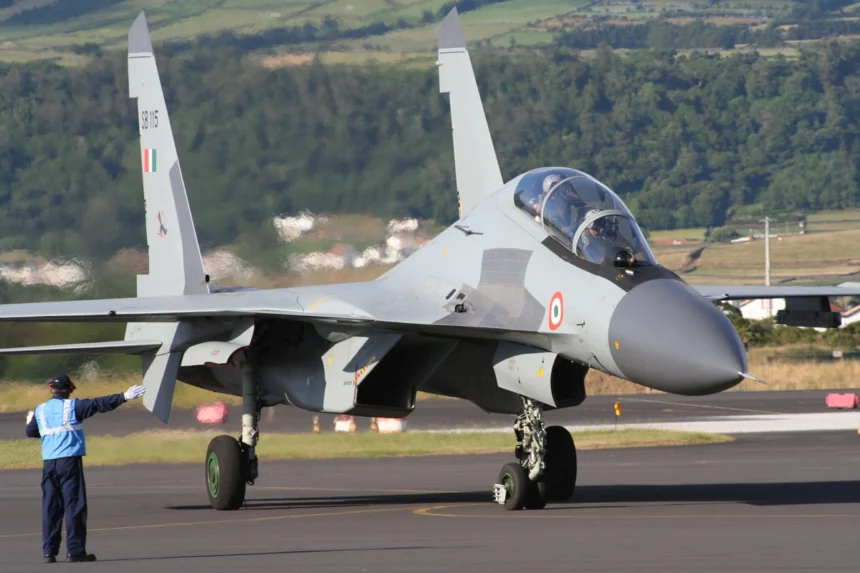In an unusual turn of events, early one morning, an unexpected phone call from the Chinese ambassador to Rawalpindi set off a chain of events that would alter the course of the skies. Within hours, an emergency plan was activated, one that had been in the works for some time.
What followed wasn’t just a typical air confrontation—it was a revelation. It shattered the long-standing myth of India’s air dominance, a narrative that had been crafted for years, and left Western powers questioning their assumptions.
For days, the Indian Air Force had been preparing for a major offensive, positioning around 180 aircraft on the western front. Their aim was clear: replicate the Balakot airstrike, break through Pakistan’s defenses, and reclaim their strategic edge in the region.
But the skies were different this time.
The Indian Air Force never crossed the line it had set. They knew what lay beyond it:
-
Pakistan’s J-10C fighter jets, poised for action.
-
Chinese-made PL-15 missiles—silent and deadly, with a range of over 300 kilometers and a speed five times the speed of sound.
-
Advanced Erieye radar systems that connected every target into a lethal network.
This wasn’t just about facing Pakistani pilots. India was up against China’s complete aerial warfare strategy, operating from Skardu to Pasni. And as for the Rafale? It never saw what hit it.
One of India’s prized Rafale jets, worth over $250 million, was reportedly shot down mid-air. Another barely made it back. The Spectra Electronic Warfare (EW) system, designed to protect the jet, failed completely. The PL-15 missile wasn’t tracked by traditional radar but by AI-powered, silent technology.
It wasn’t a dogfight. It was an ambush.
With the support of Chinese satellites and AWACS, Pakistan’s Air Force executed a successful “sensor fusion” operation. The Rafale couldn’t even lock onto its target, let alone engage. By the time the missile struck, the battle was over.
Why Has India Grounded Its Air Force?
So why has the Indian Air Force grounded its aircraft?
It’s not about a lack of bravery. It’s about a loss of confidence.
The implications are significant. India’s prized Rafale, touted as their technological marvel, was shot down by a Chinese missile. This wasn’t just a military failure—it was a political message.
Even major publications like Bloomberg took notice: this was a live demonstration of China’s integrated warfare strategy with Pakistan.
Western analysts were stunned. French defense contracts were thrown into doubt. And China, silently, was smiling.
The Game Has Changed
This isn’t 2019. This isn’t Balakot.
Now, India understands that entering Pakistan’s airspace is akin to walking into a death trap—one designed with J-10Cs, PL-15s, and Pakistan’s unwavering resolve.
That’s why they stay behind. They are grounded by fear, blind to the radar’s eye, and quietly humiliated.
Indian pilots didn’t lose due to a lack of skill. They lost in a battlefield they couldn’t even see, one created by satellites, sensors, and advanced technologies.
A Strategic Shock
May 2025 marked a turning point. India’s dream of air superiority—buoyed by the purchase of 36 Rafale jets, Spectra EW systems, and French engineering—came crashing down in the skies over Kashmir.
This wasn’t a typical aerial combat situation. This was the collapse of a concept, witnessed by military experts around the globe.
The Rafale, once considered “invincible” and technologically superior to even the F-35, found itself trapped in a system it couldn’t detect, couldn’t avoid.
The Silent Kill: China’s Power Play
China’s intervention was subtle but powerful. It wasn’t what many analysts expected.
No J-20 jets, no declaration of war. Just a network—a silent chain that observed every movement:
-
Saab Erieye AWACS, patrolling quietly.
-
J-10C fighters launching missiles in passive radar mode.
-
PL-15E missiles, traveling at Mach 5, with pinpoint accuracy, launched from over 300 kilometers.
The Rafale never even realized it was targeted until the missile was within 50 kilometers.
At that speed, the Indian pilot had just 9 seconds to react. There was no time to evade. No time for escape.
The Aftermath: Why India’s Air Force Is Grounded
Now, you won’t find Indian fighter jets patrolling Kashmir skies.
Why?
Because every time they take flight, Pakistan’s radar spots them. Erieye detects what Indian radars miss. The PL-15 missile is launched from beyond the Rafale’s detection range.
India’s Rafale, once their “silver bullet,” has become just another $250 million target.
India’s Air Force is now flying 300 kilometers behind its own borders.
A repeat of Balakot? Not in this airspace.
A Conceptual Breakdown
The world is watching the aftermath.
Shares in Dassault Aviation have stalled. Chinese defense companies—AVIC, ALD Chengdu—are seeing a rapid rise.
Because the decision in the battlefield wasn’t made through a dogfight. It was decided by the dominance of C4ISR:
Command, Control, Communication, Computers, Intelligence, Surveillance, and Reconnaissance.
Pakistan didn’t defeat India with sheer force. They beat them with a network.
And India, stunned, was forced to ground its planes.
India’s Loss, Pakistan’s Message
India invested in platforms. Pakistan invested in a “complete system.”
Modi’s mantra was: “Buy superiority.”
Reality showed: “You must build it.”
No Spectra system can stop a missile it can’t see.
No EW system can deceive a missile powered by satellite data.
No fighter jet can survive a strike it never saw coming.
The skies have changed.
This isn’t the end of aerial warfare.
It’s the beginning of a new, silent, unseen, and unstoppable air superiority.
Dr. Osama Shafiq, “India’s Air Force Grounded After Strategic Defeat,” The Telegraph, 8 May 2025. Available at: https://www.telegraph.co.uk/gift/9caaf214c46509a7















Well…let’s see. Things are still going….oont kisi karwat to bhatega.
Nice analysis, Dr sahib.👍
It’s high time India and Pakistan realized that they are wasting precious resources on military confrontations. Instead of falling into the trap set by the West and China—becoming a testing ground for their weapons—both nations must embrace sanity. They should move beyond rhetoric and claims of supremacy, opting instead for bilateral cooperation to prioritize the welfare of their people.